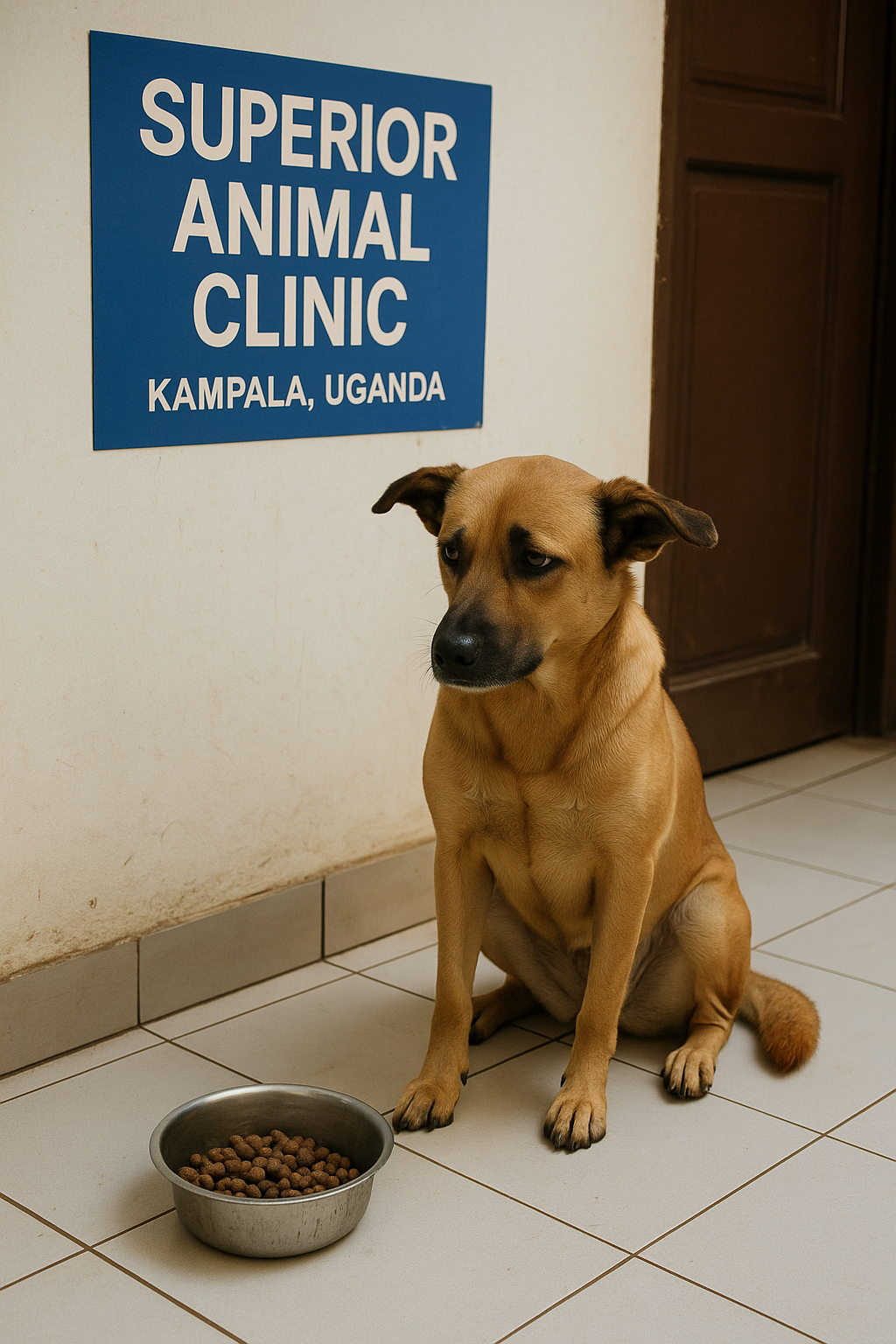
One of the most worrying signs for any pet parent is when a dog suddenly refuses to eat. In Kampala and surrounding areas like Ntinda, Old Kampala, Kasubi, Nsambya, Katwe, Zana, Makindye, Buziga, Munyonyo, Nakawa, Rubaga, Muyenga, Naguru, Bugolobi, Kabowa, Kabojja, Lugogo, Lubowa, Seguku, Ndejje, Kololo, Mutundwe, Bukoto, Bulindo, and Kulambiro, dog owners often search for answers online with questions like “Why is my dog not eating?” or “Where can I find the best veterinary clinic for dogs with loss of appetite in Kampala?”
Loss of appetite in dogs can look simple but is often a sign of deeper health problems ranging from worms and infections to stress, poisoning, or organ failure. At Superior Animal Clinic, located in Makindye along Salaama Road, we see many cases of dogs refusing food, and we know how distressing it can be for pet owners. This article will guide you through the causes, treatments, home remedies, and prevention tips for lack of appetite in dogs, while also showing why Superior Animal Clinic is the most trusted veterinary clinic for treating appetite loss in dogs across Kampala and beyond.
Common Causes of Lack of Appetite in Dogs in Uganda
When a dog stops eating, it can be worrying and confusing for any pet parent. Many dog owners from areas like Ntinda, Nsambya, Katwe, Zana, Muyenga, and Makindye often come to Superior Animal Clinic asking, “Doctor, why has my dog suddenly lost interest in food?” The truth is, there isn’t just one answer. Loss of appetite (also called anorexia in dogs) can be triggered by several different health and environmental issues. Let’s break them down so you know exactly what could be happening with your furry friend.
1. Parasitic Infections (Worms)
Intestinal worms are among the most common causes of appetite loss in Kampala’s dogs. Dogs that roam freely in areas like Kasubi, Katwe, or Nsambya are especially prone to picking up parasites from contaminated food, garbage, or soil. Worms not only steal nutrients from your dog but can also cause stomach pain, vomiting, and bloating, which makes them refuse food.
👉 Tip: Regular deworming at Superior Animal Clinic is one of the best ways to keep your dog eating well.
2. Stomach Upsets and Food-Related Issues
Many Ugandan households feed their dogs leftovers, and while this may be convenient, it can sometimes lead to stomach upsets. Spoiled food, fatty meals, or contaminated scraps can irritate a dog’s digestive system, leading to nausea and loss of appetite.
👉 Tip: Stick to clean, balanced dog food or vet-recommended diets.
3. Infections and Diseases
Infections such as parvovirus, distemper, or bacterial illnesses are notorious in Kampala. One of the earliest signs dog owners notice is a sudden refusal to eat. This is your dog’s way of signaling that something is seriously wrong. Left untreated, these infections can become life-threatening.
👉 Tip: Vaccination and early treatment at Superior Animal Clinic can save your dog’s life.
4. Dental and Mouth Problems
Imagine trying to eat with a toothache—it’s painful! Dogs are no different. Gum disease, broken teeth, or oral injuries make chewing extremely uncomfortable. Many dog owners bring their pets to us after days of worrying that their dog is “picky,” only for us to discover that the issue is dental pain.
👉 Tip: Routine dental checks at Superior Animal Clinic help prevent these hidden problems.
5. Stress and Environmental Changes
Dogs are very sensitive to their surroundings. Moving to a new home in places like Muyenga or Munyonyo, introducing a new pet, or even loud noises can cause stress. Stressed dogs often lose interest in food until they feel safe again.
👉 Tip: Keep your dog’s environment calm, and if appetite loss continues, consult our vets for appetite stimulants and supportive care.
6. Organ Problems (Kidney, Liver, Pancreas)
Loss of appetite can sometimes be a symptom of a more serious condition such as liver disease, kidney failure, or pancreatitis. These illnesses are more common in older dogs and require immediate veterinary attention.
👉 Tip: Early blood tests and scans at Superior Animal Clinic help detect and manage these problems before they get worse.
7. Heat Stress and Weather Changes
Kampala can get very hot, especially in neighborhoods like Nakasero, Rubaga, and Lugogo. During hot days, many dogs naturally eat less. However, prolonged refusal to eat should not be ignored.
👉 Tip: Always provide plenty of clean drinking water and shade.
8. Poisoning
Sadly, poisoning is a common reason why dogs lose their appetite in Uganda, particularly in areas like Katwe, Nsambya, and Kasubi, where dogs may scavenge or be intentionally poisoned. Symptoms may include drooling, weakness, vomiting, and refusal to eat.
👉 Tip: If you suspect poisoning, rush your dog to Superior Animal Clinic immediately.
9. Vaccination Reactions
Some dogs temporarily lose their appetite after routine vaccinations. This is usually mild and lasts less than 24 hours. However, if refusal to eat continues, it may signal an adverse reaction.
👉 Tip: Always monitor your dog after vaccination and report unusual symptoms to Superior Animal Clinic.
10. Pain and Injuries
Dogs in active neighborhoods such as Ndejje, Seguku, or Kasubi often get into fights, car accidents, or sustain injuries while roaming. Pain from wounds, broken bones, or internal trauma can reduce a dog’s desire to eat.
👉 Tip: Loss of appetite after an accident should never be ignored—bring your dog to us for a check-up.
11. Medication Side Effects
Certain drugs, especially strong antibiotics, dewormers, or painkillers, can cause nausea and appetite loss as a side effect.
👉 Tip: If your dog recently started medication and isn’t eating, consult Superior Animal Clinic for advice on safe alternatives.
12. Cancer and Tumors
Although less common, cancers—particularly of the digestive tract—are seen in older dogs in Uganda. Tumors often cause chronic loss of appetite, weight loss, and weakness.
👉 Tip: Early screening at Superior Animal Clinic gives dogs the best chance of recovery.
13. Respiratory Illnesses
Dogs with kennel cough, pneumonia, or severe flu may refuse food because breathing is already difficult. Appetite loss often comes with coughing, nasal discharge, or labored breathing.
👉 Tip: Isolate sick dogs to prevent spread and get them treated quickly.
14. Hormonal and Metabolic Disorders
Conditions like diabetes, hypothyroidism, or Addison’s disease can cause dogs to lose their appetite. These are more subtle and require blood tests for diagnosis.
👉 Tip: Regular vet check-ups help detect these hidden causes early.
15. Behavioral Causes (Picky Eaters)
Not every loss of appetite is due to disease. Some dogs simply become picky, especially if they are fed too many treats, table scraps, or keep changing diets.
👉 Tip: Stick to a consistent feeding routine with vet-recommended diets.
16. Old Age and Cognitive Decline
Senior dogs in areas like Kololo, Muyenga, and Nakasero sometimes eat less due to reduced metabolism or even memory issues (dog dementia). Appetite loss in these cases often needs supportive care.
17. Toxins in the Environment
Dogs in Kampala often come across toxic plants, spoiled meat, chemicals, or even rat poison. These toxins suppress appetite and can quickly turn fatal.
👉 Tip: Keep your home environment safe and avoid leaving harmful substances where your dog can access them.
18. Heat Cycle and Reproductive Issues
Female dogs in heat or pregnancy sometimes eat less. Similarly, male dogs may lose appetite when distracted by the scent of females in heat around the neighborhood.
👉 Tip: If loss of appetite is linked to reproductive cycles, consult us for spaying/neutering options to stabilize your dog’s health.
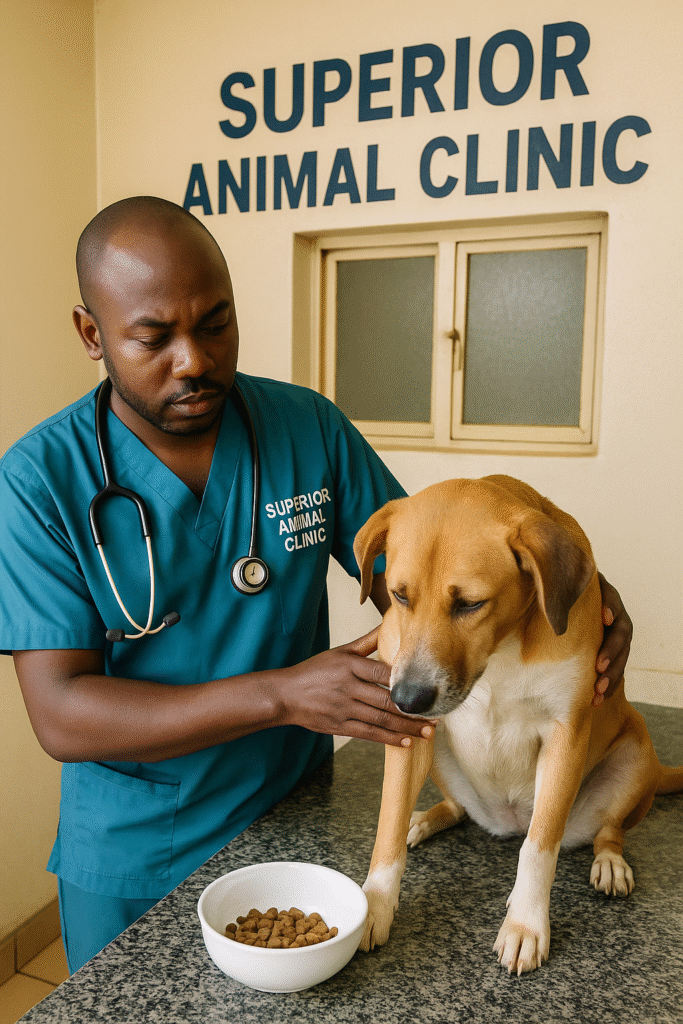
Predisposing Factors: Which Dogs Are More Prone?
- Puppies – more vulnerable due to weak immunity.
- Senior dogs – often develop chronic diseases that reduce appetite.
- Unvaccinated dogs – more likely to contract infections.
- Dogs that roam freely in Kampala neighborhoods – exposed to contaminated food, parasites, and poisons.
Symptoms to Watch Out For
Dog owners in Kampala usually bring their pets to Superior Animal Clinic after noticing:
- Refusal to eat for more than 24 hours
- Vomiting or diarrhea
- Lethargy and weakness
- Weight loss
- Bad breath or drooling
- Swollen abdomen
How Superior Animal Clinic Treats Lack of Appetite
At Superior Animal Clinic in Makindye, we take a step-by-step approach to treating lack of appetite in dogs:
- Physical Examination – checking mouth, abdomen, and overall body condition.
- Laboratory Tests – blood tests, stool analysis, and scans to detect worms, infections, or organ problems.
- Deworming and parasite control – using effective and safe medications.
- Treating underlying diseases – such as antibiotics for infections, or IV fluids for dehydration.
- Appetite stimulants and vitamins – to help dogs regain strength.
- Special diet plans – including soft, highly digestible foods for weak dogs.
- Pain management – for dogs with dental or internal issues.
Common Drugs & Treatments for Appetite Loss in Dogs in Kampala, Uganda
When your dog suddenly refuses to eat, it’s natural to feel worried. Many pet owners across Kampala – from Ntinda and Muyenga to Katwe and Kasubi – often ask us at Superior Animal Clinic in Makindye: “What medicine or treatment will make my dog eat again?”
The truth is, there isn’t one single pill that magically restores appetite. Instead, the treatment depends on the cause of appetite loss, and that’s why visiting a professional veterinary clinic like Superior Animal Clinic is so important. Below are the most effective drugs and treatments we commonly use in Uganda to help dogs regain their appetite.
1. Dewormers (Anti-parasitic Drugs)
One of the leading causes of appetite loss in Kampala’s dogs is worm infestations. Dogs that roam in areas like Nsambya, Katwe, and Kasubi are at high risk of picking up parasites.
- Common dewormers used at Superior Animal Clinic include:
- Fenbendazole – effective against roundworms, hookworms, and whipworms.
- Albendazole – broad-spectrum, widely available in Uganda.
- Praziquantel – specifically targets tapeworms, common in dogs that scavenge leftover meat.
👉 After deworming, many dogs start eating again within a few days.
- Fenbendazole – effective against roundworms, hookworms, and whipworms.
2. Antibiotics for Infections
Bacterial infections in the gut, mouth, or other organs can cause dogs to stop eating. In such cases, we prescribe targeted antibiotics to clear the infection.
- Common antibiotics we use include:
- Amoxicillin-Clavulanic Acid – for general bacterial infections.
- Metronidazole – especially for gut-related infections and diarrhea.
- Enrofloxacin – for resistant infections.
👉 Antibiotics are always prescribed after proper diagnosis at our clinic, never as a guess.
- Amoxicillin-Clavulanic Acid – for general bacterial infections.
3. IV Fluids & Electrolyte Therapy
Dogs that refuse food often become dehydrated, especially in Kampala’s hot weather. At Superior Animal Clinic, we administer IV fluids to restore hydration and balance electrolytes.
- Helps flush out toxins
- Improves energy levels
- Prepares the body to start eating again
4. Appetite Stimulants
Sometimes, once the underlying cause is treated, the dog still needs a little “push” to start eating. That’s where appetite stimulants come in.
- Common appetite stimulants used in Kampala:
- Cyproheptadine – often given to dogs that are weak but otherwise stable.
- Mirtazapine – effective for dogs with chronic illnesses or post-surgery recovery.
👉 These drugs are carefully prescribed by our veterinarians at Superior Animal Clinic to avoid overdosing or side effects.
- Cyproheptadine – often given to dogs that are weak but otherwise stable.
5. Pain Relief & Anti-Inflammatory Drugs
Dogs with dental disease, injuries, or joint pain may refuse to eat because chewing hurts.
- NSAIDs like Carprofen or Meloxicam are used to reduce pain and inflammation.
👉 Once the pain is relieved, many dogs start eating comfortably again.
6. Probiotics & Vitamin Supplements
In Kampala, many dogs with appetite loss suffer from poor gut health or nutrient deficiencies.
- Probiotics help restore healthy gut bacteria, especially after infections or antibiotic use.
- Vitamin B-complex and Multivitamins improve metabolism and encourage appetite.
7. Special Diet Plans
Drugs alone are not enough – food therapy plays a key role in recovery. At Superior Animal Clinic, we recommend:
- Prescription recovery diets (soft, highly digestible food)
- Home-cooked options like boiled chicken, rice, and pumpkin for sensitive stomachs
- Fish and broth-based meals for dogs recovering from illness
💡 Important Note for Dog Owners in Kampala:
Never give human drugs to your dog without veterinary advice. Some medications, like paracetamol or ibuprofen, are highly toxic to dogs. Always consult Superior Animal Clinic for safe, professional treatment.
👉 At the end of the day, the right drug or treatment for appetite loss depends on what is causing the problem in your dog. That’s why at Superior Animal Clinic in Makindye along Salaama Road, we don’t just give medicine — we run the right tests, identify the root cause, and then provide a personalized treatment plan to get your dog eating and healthy again.
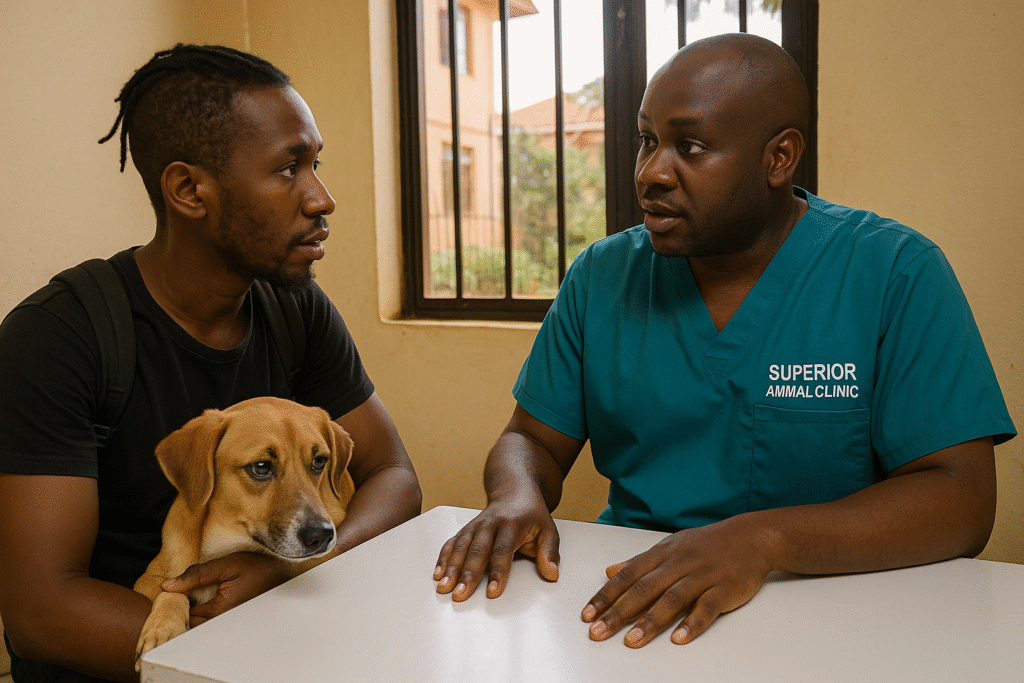
Home Remedies for Lack of Appetite in Dogs
While professional treatment at Superior Animal Clinic is always recommended, some home remedies can help mild cases:
- Offering warm chicken broth or boiled chicken and rice
- Feeding soft, palatable foods instead of dry kibble
- Keeping dogs hydrated with clean water
- Reducing stress by creating a calm environment
👉 Important: Home remedies are only supportive. If your dog refuses to eat for more than 24 hours, visit Superior Animal Clinic immediately.
Best Foods for Dogs with Loss of Appetite in Kampala, Uganda
When a dog refuses to eat, many owners in Kampala worry about how to keep their pet strong and healthy. Food plays a major role in recovery, and at Superior Animal Clinic in Makindye, we always guide dog owners on the best foods to encourage eating and restore strength.
1. Boiled Chicken and Rice
This is one of the easiest and safest meals to prepare for a dog with appetite loss. Boiled chicken (without spices or salt) is soft, tasty, and gentle on the stomach, while plain white rice provides energy. Many dogs in neighborhoods like Ntinda, Muyenga, and Munyonyo respond well to this meal because it is light and easy to digest.
👉 Tip: Shred the chicken into small pieces and mix it with a little warm broth to make it more appealing.
2. Fish and Pumpkin Mash
In areas like Kasubi, Katwe, and Zana, fish is a readily available source of protein. When cooked plainly (without bones, salt, or oil) and mashed with soft pumpkin, it becomes an excellent meal for dogs recovering from appetite loss. Pumpkin soothes the digestive system and helps with mild diarrhea.
👉 Tip: Always debone fish carefully to avoid choking hazards.
3. Goat Meat or Beef Broth
In Kampala, many dog owners prefer beef or goat meat. Boiling meat into a broth creates a nutrient-rich, aromatic soup that tempts even the weakest dogs to eat. You can pour the broth over rice or bread to make it tastier.
👉 Tip: Avoid fatty cuts, salt, and seasoning—keep it simple and plain.
4. Soft, Wet Dog Food (Prescribed Diets)
At Superior Animal Clinic, we stock veterinary-approved recovery diets specially designed for weak or sick dogs. These foods are soft, highly nutritious, and often flavored to encourage eating. Many dog owners in Bugolobi, Kololo, Nakasero, and Naguru prefer these options because they save time and ensure complete nutrition.
5. Eggs (Boiled or Scrambled Without Oil)
Eggs are rich in protein and can boost your dog’s strength. For dogs in Kampala with mild appetite loss, soft scrambled eggs (without oil or spices) or boiled eggs mashed into rice are a good option.
👉 Tip: Do not feed raw eggs—they can cause stomach upsets and bacterial infections.
6. Mashed Sweet Potatoes or Irish Potatoes
In areas like Mutundwe, Kabowa, and Lubowa, potatoes are common household foods. Mashed boiled potatoes are gentle on the stomach and provide energy for weak dogs. You can mix them with chicken broth to make the meal more appealing.
7. Special Recovery Diet Mix at Superior Animal Clinic
For dogs that completely refuse food, we sometimes recommend nutritional supplements and recovery diets available at our clinic. These are specially formulated with balanced proteins, vitamins, and minerals to help dogs regain strength quickly.
💡 Interactive Guidance for Dog Owners in Kampala:
- Try warming the food slightly before serving—it enhances aroma and stimulates appetite.
- Serve small portions several times a day instead of one large meal.
- Always provide fresh, clean drinking water.
- If your dog refuses all these foods for more than 24 hours, visit Superior Animal Clinic in Makindye immediately for proper diagnosis and treatment.
✅ At Superior Animal Clinic, we not only treat the medical causes of appetite loss but also create customized feeding plans for dogs based on their condition, breed, and lifestyle. That’s why dog owners from Ntinda to Munyonyo, Rubaga to Nakawa, and even Mityana trust us with their pets.
Prognosis: What Happens if You Don’t Treat?
If left untreated, lack of appetite in dogs can lead to:
- Malnutrition and weight loss
- Weakened immunity
- Worsening of hidden diseases
- Death in severe cases like poisoning or parvovirus
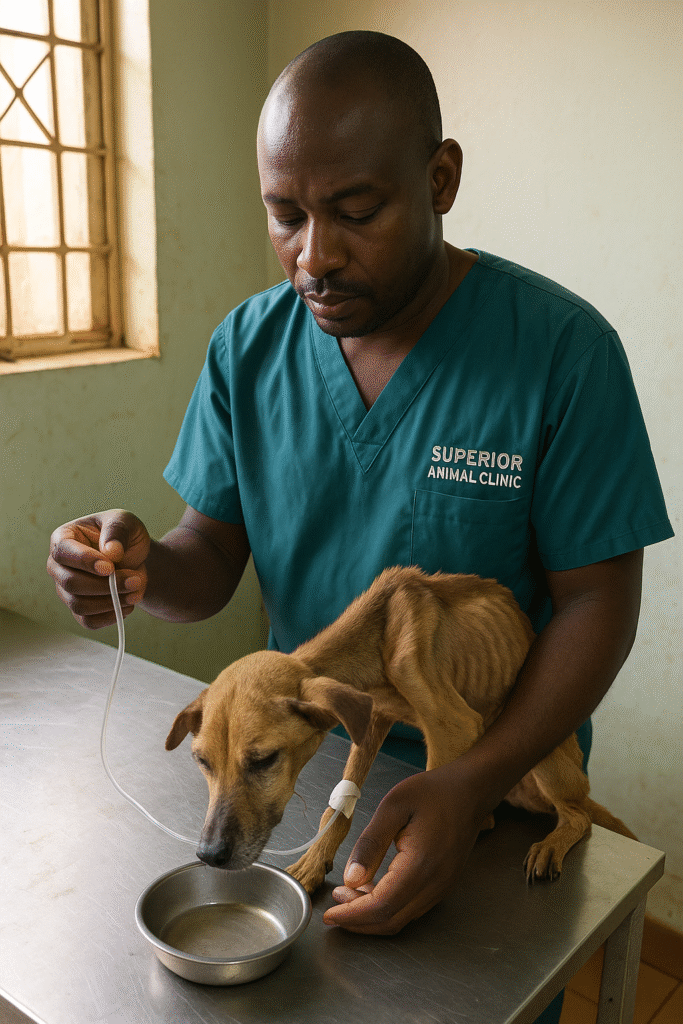
How to Prevent Loss of Appetite in Dogs in Kampala, Uganda
Preventing loss of appetite in dogs is much easier than treating it after it has already started. In Kampala and surrounding areas such as Ntinda, Muyenga, Munyonyo, Kasubi, Katwe, and Nakawa, many cases we see at Superior Animal Clinic could have been avoided with a few simple but consistent preventive measures. Here’s how you can keep your dog eating well and full of energy:
1. Stick to a Safe and Balanced Diet
In Kampala, it is common for dogs to be fed leftovers or street food. While this may look convenient, it often leads to stomach upsets, worms, and food poisoning. Instead:
- Feed your dog quality commercial dog food or well-cooked homemade meals.
- Avoid spoiled food, bones, and fatty scraps, especially from roadside vendors in areas like Katwe or Kasubi.
- Always introduce new foods gradually to avoid digestive problems.
👉 Tip from our vets: Dogs thrive on consistency. Sudden changes in diet are one of the leading causes of appetite loss.
2. Regular Deworming and Vaccination
Parasites and preventable diseases are a top cause of poor appetite in Ugandan dogs. At Superior Animal Clinic, we recommend:
- Deworming every 3 months using reliable veterinary dewormers.
- Annual vaccinations against parvovirus, distemper, and rabies – diseases that are very common in Kampala.
👉 Many dog owners in Ndejje, Seguku, and Zana wait until their dogs are visibly sick before deworming. By then, worms have already caused damage. Prevention is always cheaper and safer.
3. Keep Clean Drinking Water Available
Kampala’s hot climate, especially in places like Makindye, Munyonyo, and Bugolobi, can quickly dehydrate a dog. A dehydrated dog often refuses food. Always:
- Provide fresh, clean water daily.
- Wash water bowls frequently to prevent bacteria build-up.
4. Protect Your Dog from Poisoning
In many Kampala neighborhoods, dogs roam freely and eat garbage, plastics, or even poisoned food left for stray animals. To prevent this:
- Supervise your dog when outdoors.
- Keep them away from garbage heaps in areas like Nsambya, Kasubi, or Katwe.
- Fence your compound if possible, to limit roaming.
👉 Important: If you suspect poisoning, bring your dog to Superior Animal Clinic immediately. Appetite loss is often the first warning sign.
5. Routine Veterinary Check-ups
A regular visit to Superior Animal Clinic in Makindye helps catch hidden problems before they become serious. During check-ups, we:
- Check teeth and gums for dental disease (a major cause of appetite loss).
- Perform stool and blood tests to detect early infections.
- Give nutritional advice specific to your dog’s age and breed.
6. Reduce Stress and Anxiety
Dogs in busy Kampala areas like Kololo, Ntinda, and Lugogo often get stressed by traffic noise, new environments, or even loneliness when left alone for long hours. Stress can make a dog refuse food. You can help by:
- Keeping a stable daily routine.
- Providing toys and exercise to keep your dog engaged.
- Giving affection and not isolating your dog for long periods.
7. Maintain Proper Hygiene and Housing
A clean, comfortable environment encourages a healthy appetite. Ensure that your dog’s living area is:
- Free from ticks and fleas (which cause irritation and stress).
- Well-ventilated, especially during Kampala’s hot seasons.
- Safe, so your dog doesn’t injure its mouth or teeth on sharp objects.
✅ Bottom line: Preventing loss of appetite in dogs in Kampala requires a combination of good nutrition, regular deworming, vaccinations, clean water, safety from poisoning, stress reduction, and routine vet visits at Superior Animal Clinic.
👉 At Superior Animal Clinic, Makindye along Salaama Road, we not only treat dogs with appetite problems but also guide owners in Ntinda, Muyenga, Munyonyo, Kasubi, Katwe, Nakasero, and all over Kampala on how to prevent such issues before they happen. Prevention is always the best medicine!
Areas in Kampala Where Loss of Appetite in Dogs is Common
From our experience at Superior Animal Clinic, loss of appetite is more common in neighborhoods such as:
- Katwe, Nsambya, Kasubi, and Zana – due to high scavenging risk.
- Makindye, Buziga, Munyonyo, and Muyenga – where many pets eat leftovers and suffer from stress-related appetite loss.
- Nakasero, Naguru, Bugolobi, and Kololo – where appetite loss is often linked to lifestyle stress or chronic illnesses in older pets.
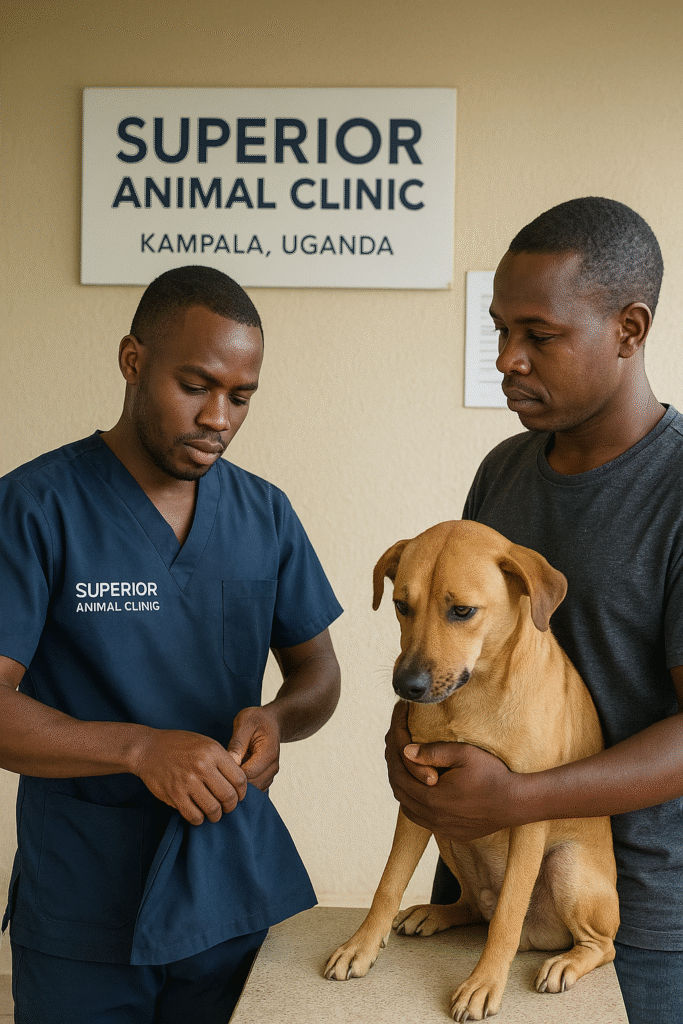
FAQs About Loss of Appetite in Dogs in Kampala, Uganda
Q1: Why is my dog not eating food in Kampala?
A: Dogs in Kampala often lose appetite due to worms, infections like parvovirus, poisoning from garbage or street food, dental issues, or stress from noisy environments. At Superior Animal Clinic, Makindye, we diagnose the exact cause and provide the best treatment to help your dog recover quickly.
Q2: Where can I find the best veterinary clinic for dogs not eating in Kampala?
A: The most trusted veterinary clinic for loss of appetite in dogs is Superior Animal Clinic, located in Makindye along Salaama Road. We serve pet owners from Ntinda, Muyenga, Munyonyo, Bugolobi, Kasubi, Nsambya, Katwe, Zana, and all other Kampala neighborhoods.
Q3: How long can a dog go without eating before I should visit a vet in Uganda?
A: If your dog refuses to eat for more than 24 hours, or shows other symptoms like vomiting, diarrhea, weakness, or swollen abdomen, visit Superior Animal Clinic immediately. Delaying treatment can lead to life-threatening complications.
Q4: What should I feed a dog with no appetite in Kampala?
A: You can try soft and easy-to-digest foods such as boiled chicken and rice, fish with mashed pumpkin, or chicken broth. However, if your dog still refuses food, bring it to Superior Animal Clinic, Makindye, for professional treatment and appetite stimulants.
Q5: Can worms make my dog stop eating in Uganda?
A: Yes. Worm infestations are very common in Kampala neighborhoods like Kasubi, Katwe, and Nsambya. Worms irritate the stomach, steal nutrients, and cause loss of appetite. Regular deworming at Superior Animal Clinic helps prevent this problem.
Q6: What home remedies can I try if my dog refuses to eat?
A: You can offer warm broth, boiled meat, or switch to softer foods. But remember—home remedies are only temporary. If your dog hasn’t eaten in 24 hours, visit Superior Animal Clinic in Makindye, because appetite loss can be a sign of serious illness.
Q7: How do I prevent appetite loss in my dog in Kampala?
A: Prevention includes regular deworming, vaccinations, safe feeding, clean drinking water, stress reduction, and routine veterinary check-ups. At Superior Animal Clinic, we provide tailored prevention programs for dogs across Ntinda, Munyonyo, Lubowa, Seguku, Ndejje, and all Kampala areas.
Q8: Is loss of appetite in dogs an emergency in Uganda?
A: Yes, especially if your dog also shows vomiting, weakness, drooling, diarrhea, or refusal to drink. These could indicate poisoning or serious infections. Always seek immediate care at Superior Animal Clinic, Makindye, where emergency treatment is available.
Q9: Which foods in Kampala commonly cause appetite problems in dogs?
A: Leftovers with too much fat, bones from roadside vendors, spoiled food from dustbins, and certain poisonous plants are common culprits. To keep your dog safe, feed controlled meals and consult Superior Animal Clinic for the best diet recommendations.
Q10: Why is Superior Animal Clinic the best choice for dogs not eating in Kampala?
A: Because we offer complete diagnostics, safe treatments, deworming, appetite stimulants, emergency care, and personalized diets. We are trusted by dog owners from Ntinda, Kololo, Muyenga, Munyonyo, Bugolobi, Nakasero, and beyond as the number one veterinary clinic for loss of appetite in dogs.
Q11: What diseases in Kampala cause dogs to stop eating?
A: In Kampala, the most common diseases that make dogs refuse food include parvovirus, distemper, tick-borne diseases (like ehrlichiosis), and dental infections. At Superior Animal Clinic, Makindye, we run lab tests to confirm the cause and provide immediate treatment.
Q12: Can hot weather in Kampala make my dog lose appetite?
A: Yes. Kampala’s hot and humid weather, especially in areas like Makindye, Bugolobi, and Muyenga, often causes heat stress, making dogs eat less. Ensure your dog always has shade, ventilation, and clean water. If appetite loss continues, bring your dog to Superior Animal Clinic.
Q13: My puppy in Ntinda is not eating — what should I do?
A: Puppies are very vulnerable to appetite loss because they dehydrate and weaken quickly. If your puppy in Ntinda, Kasubi, or Munyonyo refuses food, it may have worms, infections, or parvovirus. Visit Superior Animal Clinic immediately for urgent treatment.
Q14: How much does it cost to treat loss of appetite in dogs in Kampala?
A: The cost depends on the underlying cause — simple deworming is affordable, but treating infections or poisoning may require lab tests, medications, or hospitalization. At Superior Animal Clinic, Makindye, we offer affordable and transparent pricing for all appetite-related treatments. Ranging from UGX 20,000 to 125,000
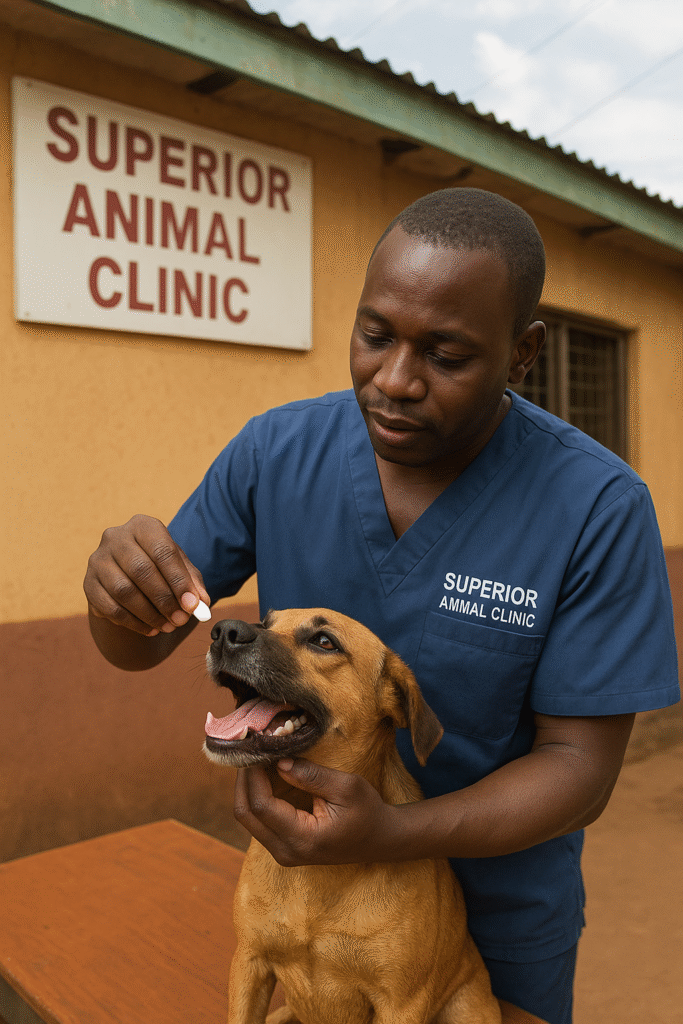
Q15: Can stress make dogs in Kampala stop eating?
A: Yes. Dogs in busy neighborhoods like Kololo, Lugogo, and Old Kampala often refuse food due to loud noises, moving to a new home, or separation anxiety. At Superior Animal Clinic, we provide advice and calming treatments to help stressed dogs regain appetite.
Q16: Is loss of appetite in dogs common in Makindye and surrounding areas?
A: Very common. In Makindye, Buziga, and Munyonyo, many dogs lose appetite due to parasites, leftover feeding, and exposure to garbage. At Superior Animal Clinic, Makindye along Salaama Road, we treat these cases daily and provide preventive care tips.
Q17: Can I buy medicine for a dog not eating from a local pharmacy in Kampala?
A: It is not safe. Many human medicines are harmful to dogs. Appetite stimulants and antibiotics should only be prescribed by a vet. Always visit Superior Animal Clinic for the right medications for your dog’s safety.
Q18: How do I know if my dog’s loss of appetite is serious?
A: It is serious if appetite loss lasts more than 24 hours or is accompanied by vomiting, diarrhea, drooling, weakness, or weight loss. In Kampala, these are often signs of poisoning or infections like parvovirus. Bring your dog to Superior Animal Clinic immediately.
Q19: What is the best food for dogs recovering from appetite loss in Uganda?
A: The best foods are boiled chicken, rice, fish, pumpkin, or prescription recovery diets available at Superior Animal Clinic. These are soft, easy to digest, and restore energy.
Q20: Can Superior Animal Clinic help prevent appetite loss in my dog?
A: Yes. We offer vaccinations, deworming, dental care, nutritional advice, and regular health check-ups to ensure your dog stays healthy and eats well. Pet owners from Ntinda, Kasubi, Ndejje, Lubowa, Seguku, and all Kampala areas trust us for prevention and treatment.
Why Choose Superior Animal Clinic?
- Experienced veterinarians in dog appetite disorders
- Modern diagnostic tools and treatments
- Emergency care for serious cases
- Affordable and reliable services
- Trusted by dog owners in Ntinda, Muyenga, Munyonyo, Bugolobi, Kololo, Makindye, and all other Kampala neighborhoods
👉 If your dog has stopped eating, call or visit Superior Animal Clinic, Makindye along Salaama Road, Kampala today. We are here to help your pet recover quickly and live a healthy life.

Understanding OKBet’s PHP (Philippine Peso) options is key. Especially when you’re depositing and withdrawing. okbetphp helped me wrap my head around it. Every little bit helps!
Домики и гостевые дома посуточно
Домики посуточно подойдут для
больших компаний.
– Можно провести время всей семьёй.
– Красивые локации для отдыха.
– Домашний комфорт и тишина.
Как выбрать жильё посуточно
@airbn@b77 https://h7.cl/1gV-l
Thanks for some other excellent article. The place else may anyone get that kind of info in such
a perfect way of writing? I’ve a presentation subsequent week, and I’m at the search
for such info. https://meds24.sbs/
Can you be more specific about the content of your article? After reading it, I still have some doubts. Hope you can help me.
Thanks for your marvelous posting! I really enjoyed
reading it, you will be a great author.I will be sure tto bookmark your blog
aand definitely will come ack from now on. I want to encourzge youu to definitely continue your
great work, have a nice evening! http://boyarka-inform.com/
Do you love gambling? crypto casino list allow you to play online using Bitcoin and altcoins. Enjoy fast deposits, instant payouts, privacy, slots, and live dealer games on reliable, crypto-friendly platforms.
Авторский блог https://blogger-tolstoy.ru о продвижении в Телеграм. Свежие гайды, проверенные стратегии и полезные советы по раскрутке каналов, чатов и ботов. Подробно о том, как увеличить аудиторию, повысить вовлеченность и эффективно монетизировать проекты в мессенджере Telegram.
Доброго времени суток.
Увидел полезную информацию.
Думаю, многим будет полезно.
Линк:
Мне зашло.
инъекции в косметологии косметология цены
Погрузитесь в мир кино https://zonefilm.media с нашим онлайн-кинотеатром! Здесь каждый найдет фильмы для себя: от захватывающих блокбастеров и трогательных драм до мультфильмов для всей семьи. Удобный интерфейс, возможность смотреть онлайн на любом устройстве и постоянно обновляемая библиотека! Присоединяйтесь и наслаждайтесь!
Нужен сувенир или подарок? https://gifts-kazan.online для компаний и мероприятий. Бизнес-сувениры, подарочные наборы и рекламная продукция с персонализацией и доставкой.
Доброго времени суток.
Наткнулся на любопытную информацию.
Решил поделиться.
Линк:
blacksprut зеркало
Вроде норм.
Лучшие подарки и сувениры корпоративные подарки 1 нанесение логотипа, подарочные наборы, промо-продукция и деловые аксессуары для мероприятий и компаний.
Нужна бытовая химия? бытовая химия для дома моющие и чистящие средства, порошки и гели. Удобный заказ онлайн, акции и доставка по городу и регионам.
Бытовая химия с доставкой магазин бытовой химии средства для уборки, стирки и ухода за домом. Широкий ассортимент, доступные цены и удобная оплата.
Your article helped me a lot, is there any more related content? Thanks! https://accounts.binance.com/register-person?ref=IHJUI7TF
UEFA Champions League http://sampiyonlar-ligi.com.az/ matches, results, and live scores. See the schedule, standings, and draw for Europe’s premier club competition.
Free online games 1001 com az for your phone and computer. Easy navigation, quick start, and a variety of genres with no downloads required.
Turkish Super League super-lig com az standings, match results, and live online scores. Game schedule and up-to-date team statistics.
Доброго времени суток.
Нарыл годную информацию.
Решил поделиться.
Линк:
кракен onion
Как вам?
Всем привет!
Наткнулся на интересную инфу.
Думаю, многим будет полезно.
Вот ссылка:
Mega onion
Пользуйтесь на здоровье.
Доброго времени суток.
Наткнулся на интересную статью.
Советую глянуть.
Вот ссылка:
kraken ссылка на сайт
Вроде норм.
Sweety Fox is a female personality who quickly catches your attention because of her warm vibe.
In her presence, you instantly notice that she knows her audience:
everything looks neat, the feed feels cohesive, and
the main idea comes across fast. Her visuals is simple but
stylish, without clutter, but with smart accents that make it feel personal.
What matters most is not the surface, but the feeling she creates: she makes it easy to engage, stays consistent in tone, and
doesn’t confuse—she guides. In the end, this creator leaves a
clear impression: you’re curious to follow along, because everything just works.
Feel free to surf to my web site: Sweetie Fox